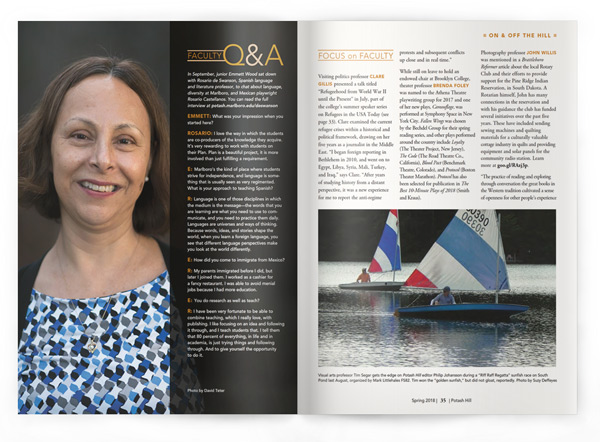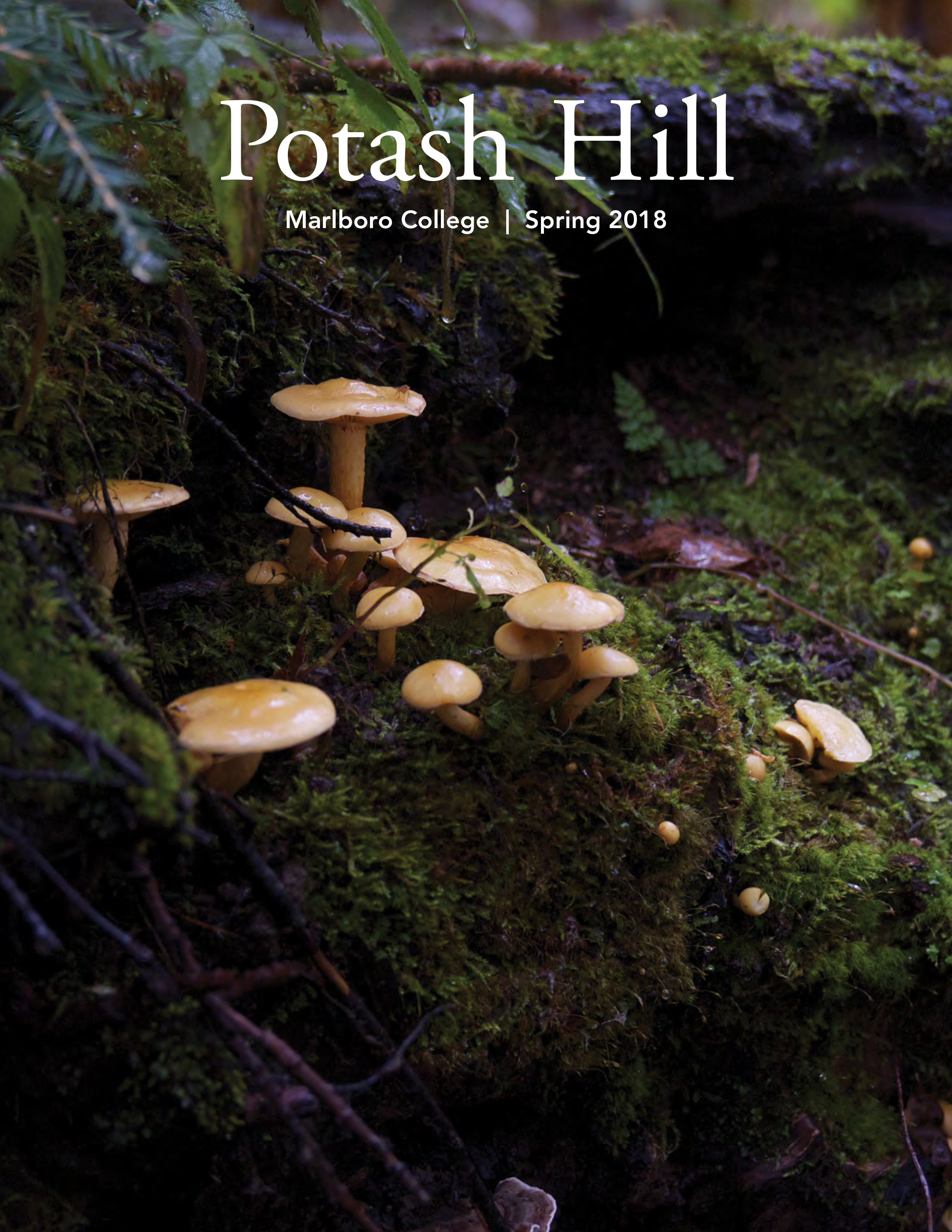
Faculty Q&A
In September, junior Emmett Wood sat down with Rosario de Swanson, Spanish language and literature professor, to chat about language, diversity at Marlboro, and Mexican playwright Rosario Castellanos. Read the full interview.
EMMETT: What was your impression when you started here?
ROSARIO: I love the way in which the students are co-producers of the knowledge they acquire. It’s very rewarding to work with students on their Plan. Plan is a beautiful project, it is more involved than just fulfilling a requirement.
E: Marlboro’s the kind of place where students strive for independence, and language is something that is usually seen as very regimented. What is your approach to teaching Spanish?
R: Language is one of those disciplines in which the medium is the message—the words that you are learning are what you need to use to communicate, and you need to practice them daily. Languages are universes and ways of thinking. Because words, ideas, and stories shape the world, when you learn a foreign language, you see that different language perspectives make you look at the world differently.
E: How did you come to immigrate from Mexico?
R: My parents immigrated before I did, but later I joined them. I worked as a cashier for a fancy restaurant. I was able to avoid menial jobs because I had more education.
E: You do research as well as teach?
R: I have been very fortunate to be able to combine teaching, which I really love, with publishing. I like focusing on an idea and following it through, and I teach students that. I tell them that 80 percent of everything, in life and in academia, is just trying things and following through. And to give yourself the opportunity to do it.
Focus on Faculty
 Visiting politics professor Clare Gillis presented a talk titled “Refugeehood from World War II until the Present” in July, part of the college’s summer speaker series on Refugees in the USA Today (see Events). Clare examined the current refugee crises within a historical and political framework, drawing on her five years as a journalist in the Middle East. “I began foreign reporting in Bethlehem in 2010, and went on to Egypt, Libya, Syria, Mali, Turkey, and Iraq,” says Clare. “After years of studying history from a distant perspective, it was a new experience for me to report the anti-regime protests and subsequent conflicts up close and in real time.”
Visiting politics professor Clare Gillis presented a talk titled “Refugeehood from World War II until the Present” in July, part of the college’s summer speaker series on Refugees in the USA Today (see Events). Clare examined the current refugee crises within a historical and political framework, drawing on her five years as a journalist in the Middle East. “I began foreign reporting in Bethlehem in 2010, and went on to Egypt, Libya, Syria, Mali, Turkey, and Iraq,” says Clare. “After years of studying history from a distant perspective, it was a new experience for me to report the anti-regime protests and subsequent conflicts up close and in real time.”
While still on leave to hold an endowed chair at Brooklyn College, theater professor Brenda Foley was named to the Athena Theatre playwriting group for 2017 and one of her new plays, Camouflage, was performed at Symphony Space in New York City. Fallen Wings was chosen by the Bechdel Group for their spring reading series, and other plays performed around the country include Loyalty (The Theater Project, New Jersey), The Code (The Road Theatre Co., California), Blood Pact (Benchmark Theatre, Colorado), and Protocol (Boston Theater Marathon). Protocol has also been selected for publication in The Best 10-Minute Plays of 2018 (Smith and Kraus).
Photography professor John Willis was mentioned in a Brattleboro Reformer article about the local Rotary Club and their efforts to provide support for the Pine Ridge Indian Reservation, in South Dakota. A Rotarian himself, John has many connections in the reservation and with his guidance the club has funded several initiatives over the past five years. These have included sending sewing machines and quilting materials for a culturally valuable cottage industry in quilts and providing equipment and solar panels for the community radio station. Learn more.
“The practice of reading and exploring through conversation the great books in the Western tradition cultivated a sense of openness for other people’s experience and other accounts of the world,” says philosophy and environmental studies professor William Edelglass. In August, William gave the commencement address for the Graduate Institute at St. John’s College, in Santa Fe, where he is an alumnus, and in the fall he gave a talk on “Reason and Faith in Indian Buddhism” at the University of Ottawa. He was also recently elected to chair of the board of directors for the International Association of Environmental Philosophy. William was instrumental in garnering a National Endowment for the Humanities grant for the Words Project in Brattleboro, Vermont. Learn more.
This fall, Asian studies and history professor Seth Harter presented a series of lectures on Japanese history and culture at the Brattleboro Chapter of the Osher Lifelong Learning Institute (OLLI). His weekly lectures focused on Japanese ways of seeing, writing, painting, building, cooking, and pursuing other activities, with emphasis on five disciplines.
“DeVos’ rewrite of the rules, published in late September, provides more flexibility in how institutions handle Title IX complaints,” writes politics professor Meg Mott, responding to the US Secretary of Education’s new Title IX rules in an October Times Higher Education article. Meg argues that the new guidelines encourage more attention to fairness and impartiality, and that colleges are given greater latitude to address the real problem of sexual assault on campuses. Teachers will no longer be compelled to report “anything that smacks of sexual impropriety,” and can encourage students in self-reflection as an alternative to mandatory reporting. Learn more.
“Like his character, Quebec Bill in Disappearances, Howard Frank Mosher was an indefatigable optimist and adventurer,” says film and video professor Jay Craven, referring to the prolific Vermont novelist and Jay’s longtime collaborator, who died in January 2017. “He wrote every day, in longhand on yellow legal pads, and lived his life, nonstop, with visions of character and story percolating in his imagination.” In December, Jay shared his reflections on three decades of collaboration at a special 25th-anniversary screening of his film Where the Rivers Flow North, both at Marlboro College and at Brattleboro’s Latchis Theatre.
 “Rosario Castellanos is a Mexican feminist playwright whose plays have not been studied,” says Spanish language and literature professor Rosario de Swanson, referring to the subject of her new book. “Her plays are very beautiful, and she’s one of the very first Mexican women who talked about homosexuality, in the ’50s and ’60s, when this was not talked about. In one of her plays she talks about not just male homosexuality but female.” You can find Rosario’s book, “¿Y cuál es mi lugar, señor, entre tus actos?”: el drama de Rosario Castellanos, published by Peter Lang Publishing Group.
“Rosario Castellanos is a Mexican feminist playwright whose plays have not been studied,” says Spanish language and literature professor Rosario de Swanson, referring to the subject of her new book. “Her plays are very beautiful, and she’s one of the very first Mexican women who talked about homosexuality, in the ’50s and ’60s, when this was not talked about. In one of her plays she talks about not just male homosexuality but female.” You can find Rosario’s book, “¿Y cuál es mi lugar, señor, entre tus actos?”: el drama de Rosario Castellanos, published by Peter Lang Publishing Group.
Religion professor Amer Latif was a panelist in a discussion titled “Democracy in the Deep Divide,” part of the October alumni weekend/open house/family day celebration. Politics professor Meg Mott moderated this discussion about whether or not Americans can still work together, and other panelists included alumni Katherine Gypson ’05 and Amber Schafer ’10.
“The way that scientists use the word ‘theory’ is a little different than how it is commonly used in the lay public,” says biology professor Jaime Tanner, as quoted in a July reference article called “What Is a Scientific Theory?” on the website livescience.com. “Most people use the word ‘theory’ to mean an idea or hunch that someone has, but in science the word ‘theory’ refers to the way that we interpret facts.” Jaime goes on to explain that a scientific theory is the framework for observations and facts—theories may change, or the way that they are interpreted may change, but the facts themselves don’t change.

